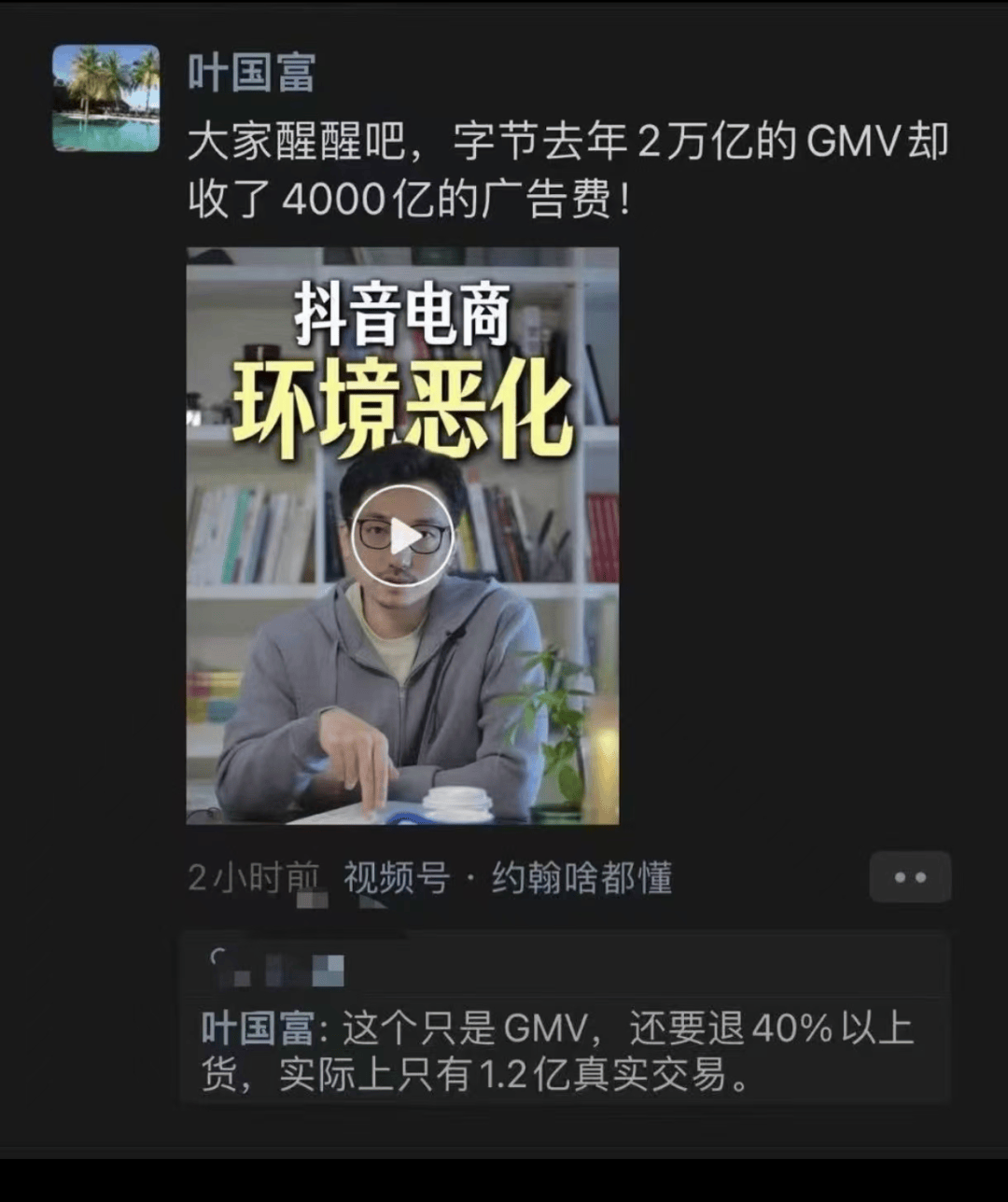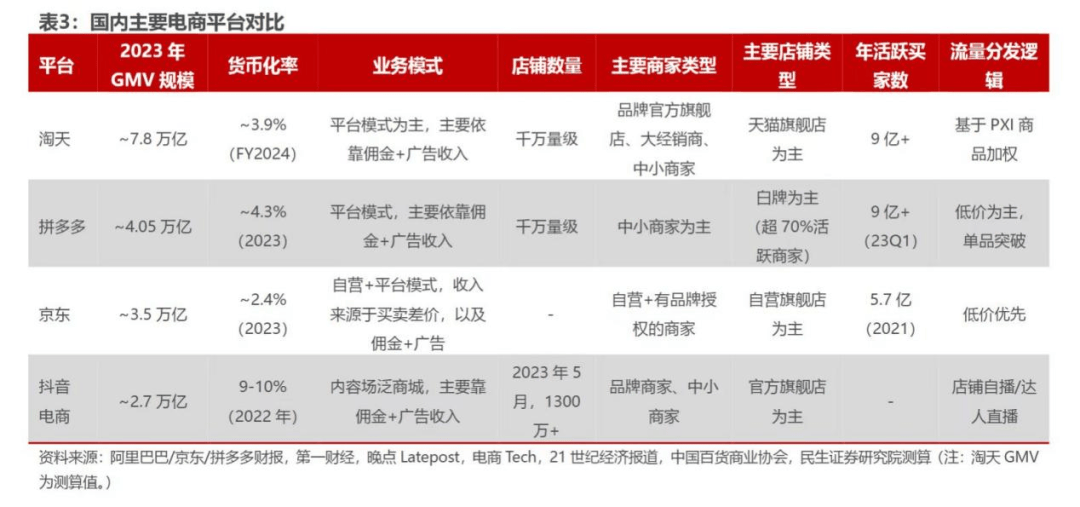Directly criticizing the deteriorating e-commerce environment on Douyin, Ye Guofu also wants to advise Zhang Yiming
![]() 11/28 2024
11/28 2024
![]() 472
472

Physical business owners are besieging Douyin.
Author|Wen Yong
Editor|Yang Zhou
The world has suffered from Douyin for a long time. After the algorithm's misconduct, the intensifying competition within the e-commerce industry has become a new problem for Douyin.

"Wake up, everyone! ByteDance collected 400 billion yuan in advertising fees from a GMV of 2 trillion yuan last year!" Recently, Ye Guofu, the founder of MINISO, called out on WeChat Moments. This is another physical business owner speaking out against Douyin, following Zhong Shanshan, the founder of Nongfu Spring, who had previously criticized Douyin's algorithm.
Dramatically, the video that Ye Guofu reposted along with his text, titled "The Deteriorating E-commerce Environment on Douyin," has since been reported and removed by ByteDance.
In the video, the blogger bluntly stated: "The deterioration of the Douyin environment affects big brands, small brands, white-label products, big influencers, and small influencers alike; no one is spared." This remark also resonated with the entrepreneurial community, with Jiang Nanchun, the founder of Focus Media, also reposting and appealing in a WeChat group.
Behind the calls from these entrepreneurs is the high level of traffic commercialization in Douyin's e-commerce.
According to public information, more than half of ByteDance's advertising revenue comes from merchants operating stores on the platform. Simply put, this means that from a GMV of 2 trillion yuan, 200 billion yuan comes from advertising. Although Ye Guofu's figures may not be entirely accurate, the real data of 200 billion yuan in advertising fees from a 2 trillion yuan GMV is still significantly higher than that of mainstream e-commerce platforms.
Among the advertising revenues of internet platforms, ByteDance generated 400 billion yuan in online advertising revenue (200 billion yuan from e-commerce) in 2023, while Alibaba generated 300 billion yuan. The platform's revenue is the merchant's expenditure. Alibaba's 300 billion yuan in advertising fees generated a GMV of 7.7 trillion yuan, while ByteDance's 200 billion yuan in advertising fees generated a GMV of 2 trillion yuan.
Simply put, investing one yuan in business on Taobao is equivalent to investing three yuan in business on Douyin. This is not only higher than Taobao but also more than double that of Pinduoduo.

According to institutional statistics, Douyin's monetization rate in 2023 reached 9%-10%, much higher than that of Pinduoduo (4.3%), Alibaba (3.9%), and JD.com (2.4%). The monetization rate, to a certain extent, represents the degree of traffic commercialization. The higher the monetization rate, the better the platform's traffic commercialization and the less free traffic available.
Of course, a higher monetization rate within a reasonable range also indicates higher merchant enthusiasm and willingness to invest in the platform for returns. However, when the monetization rate is too high, merchant enthusiasm will be affected. Since the beginning of this year, reports have shown a sharp decline in the sales growth rate of Douyin's e-commerce, from over 60% to less than 20% by September.
The combination of a low-price, internally competitive retail business environment and high commission rates for live streaming e-commerce makes it difficult to improve the internally competitive situation in Douyin's e-commerce in the short term.
If Zhong Shanshan's criticism was aimed at Douyin's algorithm, which creates an "information cocoon," serving as a perpetual motion machine for Douyin's traffic, then Ye Guofu's call is a direct hit at Douyin's internally competitive e-commerce, the moneymaker of its ecosystem. In the past, the commercial internal cycle formed by the two continuously fueled Douyin's growth and expansion, making it an internet giant capable of threatening Alibaba and Tencent.
As the new force that once challenged the platform economy takes on the guise of a platform giant, maintaining more commercial ecological balance and taking on more social responsibilities have become new challenges for Douyin.
Right after Zhong Shanshan criticized Zhang Yiming, demanding an apology and calling for the disclosure of internet platform algorithms, four central government departments jointly announced a special campaign to regulate internet platform algorithms. Among them, addressing homogeneous content push to create an "information cocoon" and fully disclosing the algorithm principles behind trending search lists are key focus areas.
From addressing the root cause of content regulation to addressing the symptoms of mechanism regulation, ByteDance, which rose to prominence as a new Chinese internet traffic platform through its algorithm recommendation mechanism, is now facing its own test of adult values.
The scrutiny faced by the perpetual motion machine of Douyin's algorithm traffic also exists for e-commerce. Since officially entering the era of live streaming e-commerce in 2020, Douyin has reached the era of 2 trillion yuan GMV in four years. As more people begin to make a living within the e-commerce ecosystem, Douyin also needs to provide more space to allow merchants to thrive.







